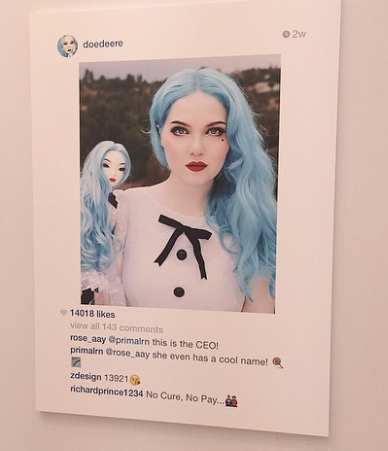A new year, a new Richard Prince appropriation and fair use dispute. Readers will recall both the controversial 2013 Second Circuit decision on Prince’s dispute with Patrick Cariou over the latter’s Yes, Rasta photographs that Prince altered, defaced, and otherwise rearranged for his Canal Zone series. Last year Prince raised the profile of this provocative exploration of the bounds of copyright with the high profile “Instagram” show in which he enlarged Instagram posts and sold them for north of $90,000 each. Prince has now been sued for copyright infringement by photographer Donald Graham, whose image was used in one of those works. Will this be more of the same, or will Prince suffer a reversal of fortune? Even adopting a liberal interpretation of the 2013 opinion, it looks from here like he may have a problem, but the final word will almost certainly not come for quite some time.
Here We Go Again? Richard Prince Sued By Photographer Over Images of Rastafarian in Instagram Show
Topics: Cariou v. Prince, Richard Prince, Second Circuit, Instagram, Larry Gagosian, Fair Use, Rastafarians Patrick Cariou
Richard Prince, Social Media and the Public Domain: Reports of Copyright’s Demise are Premature
Reactions to the Richard Prince Instagram story continue to filter in, and highlight the perpetual confusion between what is publicly available and what is in the public domain. They are not the same thing, with important legal consequences.
Topics: Richard Prince, Missy, Copyright Act, Prince v. Cariou, Canal Zone, Patrick Cariou, Suicide Girls, vulture.com, Yes Rasta, 17 U.S.C. § 107, Jerry Saltz, Instagram, Copyright, transformativeness, Fair Use, ArtNet, New York Magazine, § 107
Fair Use Fool me Twice, Shame on Me—Richard Prince Goes Trolling on Instagram But May Have a More Pedestrian Problem
Few art law cases have received as much attention as that of Richard Prince and his dispute with Patrick Cariou over the latter’s Yes, Rasta photographs that Prince altered, defaced, and otherwise rearranged for his Canal Zone series. Prince has now garnered renewed attention for his appropriation of Instagram images in a set of works he has been selling at a Gagosian Gallery show called “New Portraits" (and in various other venues over the last few months). He escaped liability for infringement of Cariou’s pictures (though the case settled after remand; several infringement claims were still in play when the parties settled). Can he do so again? If this recent effort is not infringement, it certainly begs the question of whether the fair use exception has swallowed the rule. Lastly, Instagram itself may have prohibited the entire exercise in its terms of use, a possible avenue to short-circuit the entire copyright exercise.
Topics: Richard Prince, Copyright Act, DoeDeere, 2LiveCrew, Prince v. Cariou, Roy Orbison, Canal Zone, Patrick Cariou, Internet, Yes Rasta, 17 U.S.C. § 107, Instagram, Copyright, Gagosian Gallery, transformativeness, Fair Use, § 107
Fox News Seeks to Take Fair Use Questions Over 9/11 Photo to the Second Circuit
Fox News has petitioned the Second Circuit Court of Appeals to overturn an adverse ruling over use of the iconic photograph from September 11, 2001, known as “Raising the Flag at Ground Zero.” Rightly taking issue with the mostly unhelpful guidance left by Cariou v. Prince, Fox News and personality Jeanine Pirro (recently in the news for the interviews with her as part of HBO’s The Jinx about Robert Durst) have asked for the extraordinary step of appealing the denial of their motion for summary judgment. While that motion probably won’t succeed in the short term for reasons discussed below, the issue will likely end up in the Court of Appeals at some point. The application that the defendants suggest, however, seems like an exception that would swallow the rule.
Topics: HBO, Cariou v. Prince, 9/11, Raising the Flag at Ground Zero, The Jinx, Second Circuit, World Trade Center, September 11 2001, Robert Durst, Fox News, Jeanine Pirro, Justice with Judge Jeanine, Instagram, Copyright, Herald News, Twitter, The Record, Fair Use, Thomas E. Franklin




